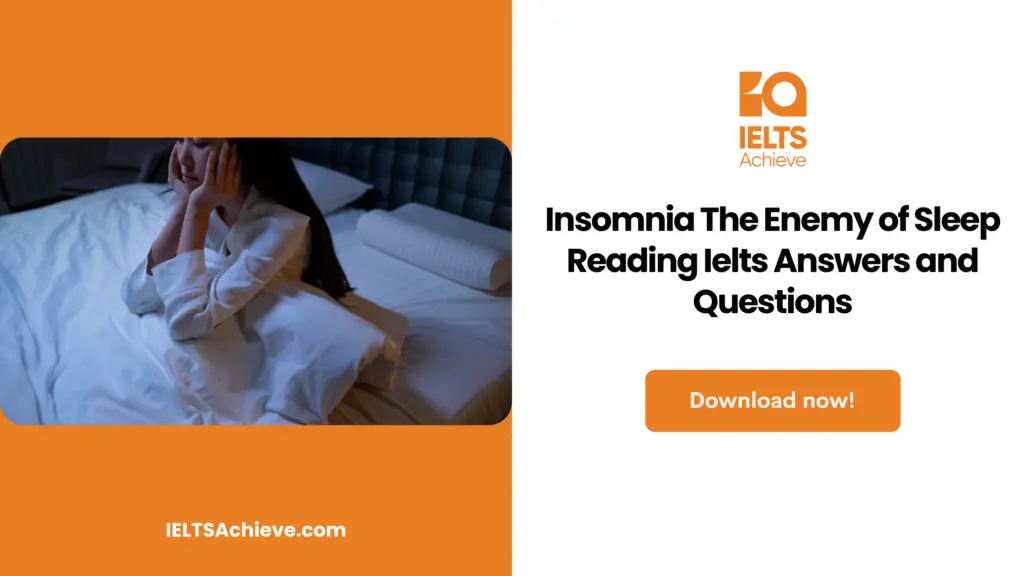The Blog post contains the following IELTS Reading Questions:
- IELTS Reading Matching Headings Questions
- IELTS Reading Yes/No/Not Given
- IELTS Reading Sentence Completion
Stay informed and prepared for success – Explore our comprehensive Reading Test Info page to get valuable insights, exam format details, and expert tips for mastering the IELTS Reading section.
IELTS Reading Passage – Insomnia the Enemy of Sleep

Insomnia The Enemy of Sleep
A. Sleep difficulties are not unusual . Insomnia, a sleep condition, can occur when you do not feel like you are having enough or comfortable sleep. One or more of the following symptoms characterise insomnia: Difficulty falling asleep, waking up repeatedly during the night and unable to return to sleep, waking up early in the morning, and not getting enough rest. Insomnia is not defined by the amount of sleep one gets each night. Everyone’s sleep requirements differ. Some people may work well on little sleep, while others require more.
B. Most insomniacs are over 60, have a history of depression, or are women, particularly after menopause. People who have experienced a great deal of emotional anguish, such as being divorced, losing a loved one, or being separated, are more prone to have difficulty sleeping. The most prevalent reasons for the inability to sleep are stress, worry, illness, and other sleep issues such as restless legs syndrome. A hectic work schedule, jet lag, brain damage from a stroke or Alzheimer’s disease, or too much alcohol or illegal drugs can all contribute to insomnia. It may also be associated with a variety of mental diseases.
C. How sleep actually occurs is a mystery. After dark, the pineal gland in your brain releases melatonin, a hormone thought to be responsible for putting you to sleep. Exactly why sleep is so crucial for one’s health and cognitive performance is a mystery. Rapid eye movement (REM) sleep and non-REM sleep are the two most well-known categories of slumber. During rapid eye movement (REM) sleep, which is associated with dreaming, eye movement occurs even while the eyelids are closed. During this stage, oxygen consumption, blood flow, and neuronal activity all peak. Four or five REM cycles occur nightly. The duration of your period may vary from ten to fifteen minutes at the start of the night to as much as thirty minutes later in the evening. Non-REM sleep, in which the body moves more slowly, occurs between REM sleep episodes. There are four distinct phases of non-REM sleep. Phases 3 and 4 of sleep are the most difficult to interrupt. The night progresses, and the non-REM sleep stages get shorter and less deep. In the initial two phases, the body repairs itself with the help of a hormone called somatostatin. Insomnia in stage 4 is linked to the development of chronic pain conditions like fibromyalgia.
D. Medical specialists are capable of diagnosing insomnia in a number of ways. Insomnia can be subdivided based on the frequency of its occurrence. There are numerous causes of inadequate sleep, but insomnia is the most prevalent. The majority of cases of insomnia fall into either primary insomnia or secondary insomnia. Primary insomnia is a chronic sleep condition that does not appear to be related to mental or physical suffering. The most prevalent type of primary insomnia is psychophysiological. Stress resulting from a medical condition is the cause of secondary insomnia.
E. All patients suffering from insomnia can benefit from instituting better sleep hygiene practices. It can be helpful to set up a restful bedroom and unwind an hour before bedtime. Some people, such as those who get up earlier than usual or have problems falling asleep, may require less sleep than they’re accustomed to. In the elderly, treating insomnia can be as simple as adjusting one’s sleep schedule by going to bed later or getting up earlier. The causes and degree of insomnia determine the course of treatment. It may not be required to treat transitory or intermittent insomnia as the symptoms only last a few days. Action needs to be taken, however, if lack of sleep is causing significant disruption to daily life. Effective treatment for insomnia typically requires fixing whatever is causing it. For instance, sleeplessness is a common symptom of depression and can be treated to improve the patient’s mood.
F. Inadequate sleep can have a detrimental influence on productivity, mood, and attention. Feeling like you “got out of bed on the wrong side” is a common symptom of sleep deprivation. Dissatisfaction may stem from feeling as though you never slept or waking up with a headache. Stress can interfere with sleep, but sleep deprivation can make it more difficult to relax. Driving when drowsy is a serious risk, especially for people who suffer from insomnia. Insomnia can have serious consequences, such as a decrease in productivity and the loss of promotional opportunities. It could make you doubt yourselves. Insomnia can sometimes mask serious mental illnesses. Despite the fact that many people with insomnia attribute their problems solely to a lack of sleep, insomnia can be an indicator of something more serious, such as depression. According to research, insomniacs are four times more likely to be depressed than people who get enough sleep. Sleep deprivation has been linked to heart disease and other major health problems. All of these issues are serious and might have far-reaching consequences.
G. Insomnia sufferers can benefit from developing sleep rituals to help them relax and drift off to sleep. Some examples of these habits include keeping a regular bedtime and wake time, eliminating coffee, nicotine, alcohol, and late-night snacking, getting regular exercise, and making sure your bedroom is a pleasant environment in terms of the bed, noise level, and temperature. People who suffer from insomnia would do well to confine their sleeping to their beds. Don’t waste the night tossing and turning if you can’t sleep. Get up and do something relaxing, like reading, until you are exhausted once more.
Unlock your full potential in the IELTS Reading section – Visit our IELTS Reading Practice Question Answer page now!
Recommended Questions:
Renewable Energy IELTS Reading Question with Answer
Insomnia the Enemy of Sleep Reading Questions
Questions 14-19
The reading passage on Insomnia has 7 paragraphs (A – G). From the list of headings below choose the most suitable headings for paragraphs B – G. Write the appropriate number (i – xi) in boxes 14 – 19 on your answer sheet. NB There are more headings than paragraphs, so you will not use them all.
i The Role of Sleep
ii Insomnia Medication
iii Habits to Promote a Good Night’s Sleep
iv What is Insomnia
v Complications for Insomniacs
vi Government Action
vii Available Treatment for Insomnia
viii The Causes of Insomnia
ix Therapy Solutions
x Types of Insomnia
xi Current Research
14 Paragraph B
15 Paragraph C
16 Paragraph D
17 Paragraph E
18 Paragraph F
19 Paragraph G
Ready to conquer Matching Headings questions? Click here to learn essential tips and techniques for matching headings accurately to paragraphs or sections in the IELTS Reading section.
Questions 20-24
Do the following statements agree with the views of the writer of the readingpassage on Insomnia?
YES if the statement agrees with the writer
NO if the statement doesn’t agree with the writer
NOT GIVEN if it is impossible to say what the writer thinks about this
20 Travelling can cause insomnia.
21 People think that REM sleep is the most important for resting the body.
22 Secondary insomnia is far more common than primary insomnia.
23 Specialized sleep clinics are available for anyone struggling with insomnia.
24 Many people with insomnia don’t even recognise they have the disorder.
Want to excel in identifying the writer’s views and claims? Click here to explore our in-depth guide on how to accurately determine Yes, No, or Not Given in the IELTS Reading section.
Questions 25-27
Complete the sentences below.
Write ONE WORD ONLY from the passage for each answer.
25. All patients suffering from insomnia can benefit from instituting better sleep _______ practices.
26. Insomnia sufferers can benefit from developing sleep rituals to help them _____ and drift off to sleep.
27. Insomnia can have serious consequences, such as a decrease in _________ and the loss of promotional opportunities.
Enhance your sentence completion skills in the IELTS Reading section. Click here to access our comprehensive guide and learn effective strategies for filling in missing words or phrases in sentences.
Unlock your full potential in the IELTS Reading section – Visit our IELTS Reading Practice Question Answer page now!
Recommended Questions:
Renewable Energy IELTS Reading Question with Answer
Insomnia the Enemy of Sleep Reading Answers
14. vii
15. i
16. x
17. vii
18. v
19. iii
20. Yes
21. No
22. Not Given
23. Not Given
24. Not Given
25. Hygiene
26. Relax
27. Productivity

We hope you found this post useful in helping you to study for the IELTS Test. If you have any questions please let us know in the comments below or on the Facebook page.
The best way to keep up to date with posts like this is to like us on Facebook, then follow us on Instagram and Pinterest. If you need help preparing for the IELTS Test, join the IELTS Achieve Academy and see how we can assist you to achieve your desired band score. We offer an essay correction service, mock exams and online courses.
